英国英语和美国英语区别大总结
英国英语和美国英语的差异
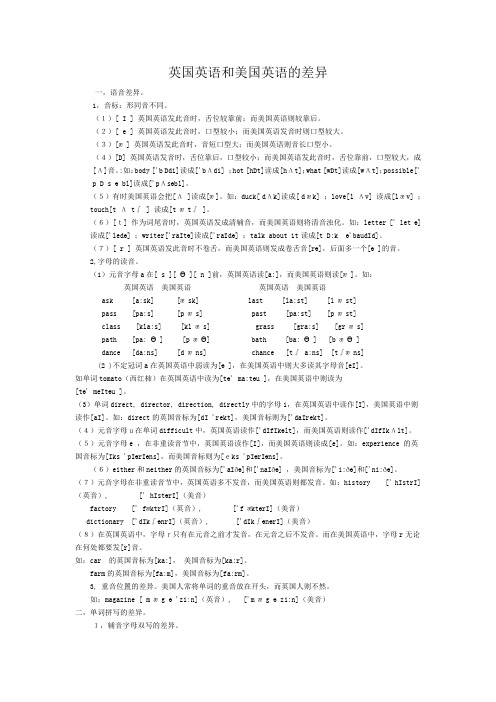
英国英语和美国英语的差异一,语音差异。
1,音标:形同音不同。
(1)[ I ] 英国英语发此音时,舌位较靠前;而美国英语则较靠后。
(2)[ e ] 英国英语发此音时,口型较小;而美国英语发音时则口型较大。
(3)[æ ] 英国英语发此音时,音短口型大;而美国英语则音长口型小。
(4)[D] 英国英语发音时,舌位靠后,口型较小;而美国英语发此音时,舌位靠前,口型较大,成[Λ]音。
:如:body ['b Ddi]读成['bΛdi] ;hot [hDt]读成[hΛt];what [wDt]读成[wΛt];possible[' p D s ə bl]读成['pΛsəbl]。
(5)有时美国英语会把[Λ ]读成[æ ]。
如:duck[ dΛk]读成[ d æ k] ;love[l Λv] 读成[l æ v] ;touch[t Λ t∫ ] 读成[t æ t∫ ]。
(6)[t] 作为词尾音时,英国英语发成清辅音,而美国英语则将清音浊化。
如:letter [' let ə]读成['ledə] ;writer['raItə]读成['raIdə] ;talk about it读成[t D:k ə'baudId]。
(7)[ r ] 英国英语发此音时不卷舌,而美国英语则发成卷舌音[rə],后面多一个[ə ]的音。
2,字母的读音。
(1)元音字母a在[ s ][ Ө ][ n ]前,英国英语读[a:],而美国英语则读[æ ]。
如:英国英语美国英语英国英语美国英语ask [a:sk] [æ sk] last [la:st] [l æ st]pass [pa:s] [p æ s] past [pa:st] [p æ st]class [kla:s] [kl æ s] grass [gra:s] [gr æ s]path [pa: Ө] [p æ Ө] bath [ba: Ө] [b æ Ө ]dance [da:ns] [d æ ns] chance [t∫ a:ns] [t∫æ ns](2 )不定冠词a在英国英语中弱读为[ə ],在美国英语中则大多读其字母音[eI]。
美式英语与英式英语的区别
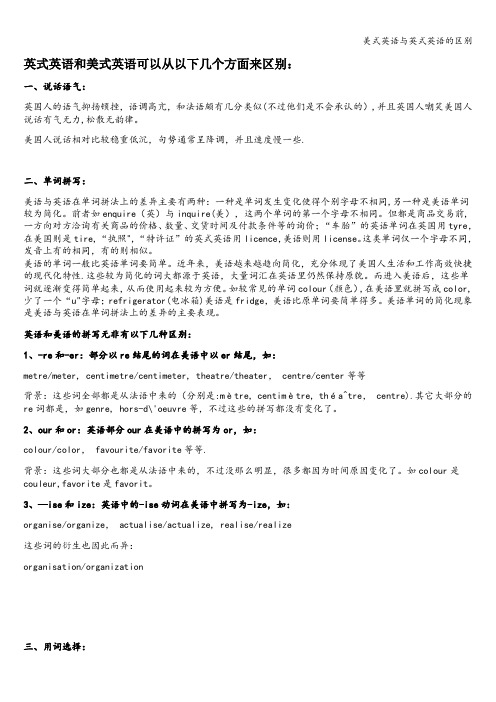
英式英语和美式英语可以从以下几个方面来区别:一、说话语气:英国人的语气抑扬顿挫,语调高亢,和法语颇有几分类似(不过他们是不会承认的),并且英国人嘲笑美国人说话有气无力,松散无韵律。
美国人说话相对比较稳重低沉,句势通常呈降调,并且速度慢一些.二、单词拼写:美语与英语在单词拼法上的差异主要有两种:一种是单词发生变化使得个别字母不相同,另一种是美语单词较为简化。
前者如enquire(英)与inquire(美),这两个单词的第一个字母不相同。
但都是商品交易前,一方向对方洽询有关商品的价格、数量、交货时间及付款条件等的询价;“车胎”的英语单词在英国用tyre,在美国则是tire,“执照",“特许证”的英式英语用licence,美语则用license。
这类单词仅一个字母不同,发音上有的相同,有的则相似。
美语的单词一般比英语单词要简单。
近年来,美语越来越趋向简化,充分体现了美国人生活和工作高效快捷的现代化特性.这些较为简化的词大都源于英语,大量词汇在英语里仍然保持原貌。
而进入美语后,这些单词就逐渐变得简单起来,从而使用起来较为方便。
如较常见的单词colour(颜色),在美语里就拼写成color,少了一个“u"字母;refrigerator(电冰箱)美语是fridge,美语比原单词要简单得多。
美语单词的简化现象是美语与英语在单词拼法上的差异的主要表现。
英语和美语的拼写无非有以下几种区别:1、-re和-er:部分以re结尾的词在美语中以er结尾,如:metre/meter, centimetre/centimeter, theatre/theater, centre/center等等背景:这些词全部都是从法语中来的(分别是:mètre, centimètre, théa^tre, centre).其它大部分的re词都是,如genre, hors-d\'oeuvre等,不过这些的拼写都没有变化了。
个人总结最全英语与美语的区别

英式英语与美式英语的区别一、拼写,美国人更注重实用性,因此美式英语的拼写比英式英语更简洁。
1. 英语单词中不发音的词尾-me, -ue音的字母u3.以-re结尾,在美语中改为-er结尾,读音不变4.以-ence为结尾,在美语中改为- ense结尾5. 英语中以-ise结尾的动词,美语中则拼作-ize6.以双写-ll-拼写的部分词,在美语中只有一个-l-7.以- xion结尾的词,美语中拼作-ction8. 其他二、同一个词在英语和美语中可能指不一样的东西(同词异义)三、同一个意思,在英语和美语中分别用不同的词语(同义异词)四、发音上的区别1. 字母a2. 字母or3. 字母5. 以-ile结尾6. 其他五、语法及表达1. 名词1-1. 美国英语将其他词类名词化的倾向比英国英语更为明显,特别是那些带介词的短语动词1-2. 集合名词做主语时,英国英语的谓语动词可以是单数形式或者复数形式,美国英语几乎是用单数形式英式:They are a family who has been very influential in the history of this country.美式或英式:The committee has decided to look into the matter further. 1-3. 名词作定语时,美国英语多用单数形式,而英国英语则常用其复数形式英式:The worker decided to form a new trades union.美式:The worker decided to form a new trade union.2. 动词英语中的to have 是个词性不明确的动词。
英国人既把它用作助动词又把它用作实义动词;美国人则一律将它当作实义动词来用。
当动词have有致使之意时,美国用have;英国对上级用get,对下级用make.英语中的to have 是个词性不明确的动词。
英国英语和美国英语之间的区别
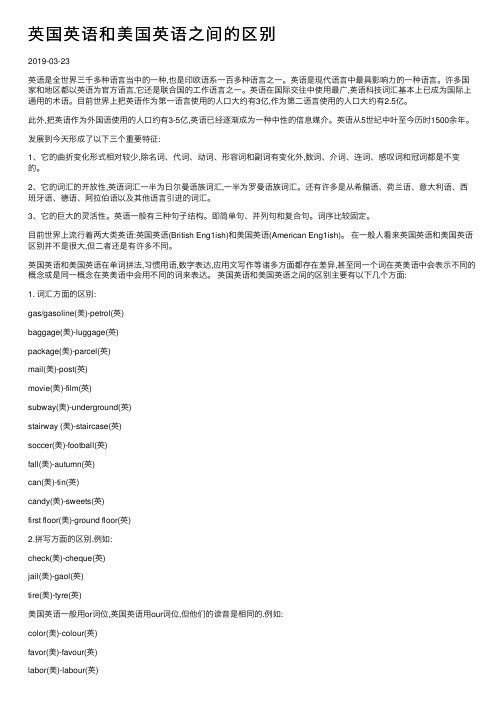
英国英语和美国英语之间的区别2019-03-23英语是全世界三千多种语⾔当中的⼀种,也是印欧语系⼀百多种语⾔之⼀。
英语是现代语⾔中最具影响⼒的⼀种语⾔。
许多国家和地区都以英语为官⽅语⾔,它还是联合国的⼯作语⾔之⼀。
英语在国际交往中使⽤最⼴,英语科技词汇基本上已成为国际上通⽤的术语。
⽬前世界上把英语作为第⼀语⾔使⽤的⼈⼝⼤约有3亿,作为第⼆语⾔使⽤的⼈⼝⼤约有2.5亿。
此外,把英语作为外国语使⽤的⼈⼝约有3-5亿,英语已经逐渐成为⼀种中性的信息媒介。
英语从5世纪中叶⾄今历时1500余年。
发展到今天形成了以下三个重要特征:1、它的曲折变化形式相对较少,除名词、代词、动词、形容词和副词有变化外,数词、介词、连词、感叹词和冠词都是不变的。
2、它的词汇的开放性,英语词汇⼀半为⽇尔曼语族词汇,⼀半为罗曼语族词汇。
还有许多是从希腊语、荷兰语、意⼤利语、西班⽛语、德语、阿拉伯语以及其他语⾔引进的词汇。
3、它的巨⼤的灵活性。
英语⼀般有三种句⼦结构。
即简单句、并列句和复合句。
词序⽐较固定。
⽬前世界上流⾏着两⼤类英语:英国英语(British Eng1ish)和美国英语(American Eng1ish)。
在⼀般⼈看来英国英语和美国英语区别并不是很⼤,但⼆者还是有许多不同。
英国英语和美国英语在单词拼法,习惯⽤语,数字表达,应⽤⽂写作等诸多⽅⾯都存在差异,甚⾄同⼀个词在英美语中会表⽰不同的概念或是同⼀概念在英美语中会⽤不同的词来表达。
英国英语和美国英语之间的区别主要有以下⼏个⽅⾯:1. 词汇⽅⾯的区别:gas/gasoline(美)-petrol(英)baggage(美)-luggage(英)package(美)-parcel(英)mail(美)-post(英)movie(美)-film(英)subway(美)-underground(英)stairway (美)-staircase(英)soccer(美)-football(英)fall(美)-autumn(英)can(美)-tin(英)candy(美)-sweets(英)first floor(美)-ground floor(英)2.拼写⽅⾯的区别.例如:check(美)-cheque(英)jail(美)-gaol(英)tire(美)-tyre(英)美国英语⼀般⽤or词位,英国英语⽤our词位,但他们的读⾳是相同的.例如:color(美)-colour(英)favor(美)-favour(英)labor(美)-labour(英)美国英语⼀般⽤er词位,英国英语则⽤re词位,但他们的读⾳是相同的.例如:center(美)-centre(英)meter(美)-metre(英)theater(美)-theatre(英)美国英语不双写辅⾳字母l,英国英语要双写辅⾳字母l,但他们的读⾳也是相同的.例如:marveled(美)-marvelled(英)quarreler(美)-quarreller(英)travely(美)-travelly(英)3.读⾳⽅⾯的区别:例如,again[e'gEin]美 [e'gain]英clerk[k'lek]美 [k'la:]英此外,像这些词汇中的元⾳字母,美国英语读作,英国英语读作。
英式英语和美式英语的不同

英式英语和美式英语的不同虽然英语口语中有很多其他方言,但美国和英国是最常见的ESL/ESOL/EFL课程。
也许这是因为赴美学生有数百万之多,而英国口音真的很迷人。
下面给大家带来一些关于英式英语和美式英语的不同,希望对大家有所帮助。
一.拼写有差异英式英语和美式英语两者的拼写大体是相同的,但是有个别细节有差距。
类似的词语还有很多,其实总结下来美国英语词尾多为-or、-ter、-og、-ize、-ction等;英国英语更喜欢用-our、-tre、-ogue、-ise、-xion等来作为单词的结尾。
另外,如果实在是不能熟练使用英式英语的拼写习惯,那就用美式英语好了,当然这只是权宜之计,最好还是要学会英式的拼写。
但是注意千万不要两者混用啊,这样看起来很奇怪。
二.用词不同在词汇的使用上,最能够表现出来英式和美式英语的差异。
相比英国英语而言,美式英语更加具有包容性和多样性,对各种文化的吸收借鉴也顺带融合了各种文化的语言特色;而英国的词汇使用更加复古和传统。
当然,美国英语的大部分词汇都来自英国英语,因为美国曾经是英国的殖民地,但是自从美国独立后,其语言就开始变化了。
举个简单的例子,美国人秋天一般用Fall,英国人却用的Autumn;人行道在美国是Sideway,英国使用Pavement。
其实语言只是习惯问题,词汇的区别主要是常用于不常用的区别,所以偶尔是可以相互替换的,但是有个别的词汇语义相差非常大。
比如在买票的时候,英国称单程或者双程为“ Single or Return”,而在美国用“ One Way or Round Trip”表示,所以在英国买票的时候千万不要以为售票员在问你是否要一张票。
还比如,英国的一楼是Ground Floor,二楼是First Floor;美国First Floor就表示一楼啦。
三.发音要区别英式英语发[w]的地方,美国英语习惯发音为[hw];When、What、Whale、Which、Why等等单词都是这样。
美国英语和英国英语
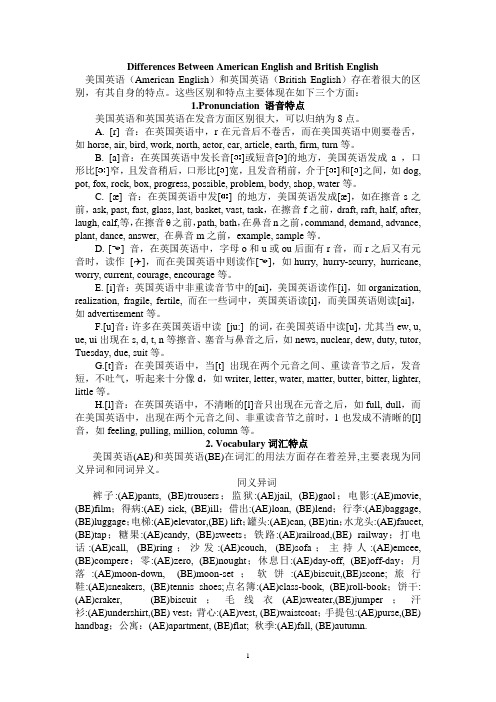
Differences Between American English and British English美国英语(American English)和英国英语(British English)存在着很大的区别,有其自身的特点。
这些区别和特点主要体现在如下三个方面:1.Pronunciation 语音特点美国英语和英国英语在发音方面区别很大,可以归纳为8点。
A. [r] 音:在英国英语中,r在元音后不卷舌,而在美国英语中则要卷舌,如horse, air, bird, work, north, actor, car, article, earth, firm, turn等。
B. [a]音:在英国英语中发长音[]或短音[]的地方,美国英语发成a ,口形比[]窄,且发音稍后,口形比[]宽,且发音稍前,介于[]和[]之间,如dog, pot, fox, rock, box, progress, possible, problem, body, shop, water等。
C. [æ] 音:在英国英语中发[] 的地方,美国英语发成[æ],如在擦音s之前,ask, past, fast, glass, last, basket, vast, task,在擦音f之前,draft, raft, half, after, laugh, calf,等,在擦音θ之前,path, bath,在鼻音n之前,command, demand, advance, plant, dance, answer, 在鼻音m之前,example, sample等。
D. [☜] 音,在英国英语中,字母o和u或ou后面有r音,而r之后又有元音时,读作[✈],而在美国英语中则读作[☜],如hurry, hurry-scurry, hurricane, worry, current, courage, encourage等。
英国人说的和美国有什么区别

英国人说的和美国有什么区别英语是世界上最重要的语言之一,在全球范围内流利地说英语对于沟通和文化交流非常重要。
然而,尽管英语是一种语言,但在英国和美国这两个英语为母语的国家,存在一些明显的语言和发音差异。
本文将讨论英国人说的和美国人说的英语在词汇、发音和语法等方面的区别。
一、词汇差异英国和美国在很多词汇上有不同的称谓。
以下是一些常见的例子:1.汽车- 英国人说:car- 美国人说:automobile2.电梯- 英国人说:lift- 美国人说:elevator3.公寓- 英国人说:flat- 美国人说:apartment4.地铁- 英国人说:underground/tube- 美国人说:subway5.零食- 英国人说:crisps- 美国人说:potato chips以上只是一小部分例子,两国之间还有许多其他的词汇差异。
这些差异可能导致在交流时产生误解,因此了解这些差异对于跨文化交流很重要。
二、发音差异英国和美国的发音差异也是比较明显的。
以下是一些典型的例子:1.字母R- 英国人说:有些字母R发音较轻或完全不发音- 美国人说:字母R通常会发音2.元音发音- 英国人说:一些元音发音较短或合并,例如"bath"和"cat"的发音相似- 美国人说:一些元音发音较长或独立,例如"bath"和"cat"的发音不同3.口音- 英国人说:英国人的发音通常较为严谨,口音差异明显,如伦敦口音与苏格兰口音- 美国人说:美国人的发音通常较为平坦,不同地区的口音差异相对较小发音差异常常给跨国交流带来困难,因此在学习英语时,要注意练习两国之间的发音差异,以避免交流不畅。
三、语法差异英国和美国的语法也存在一些差异。
以下是一些例子:1.动词时态- 英国人说:"I have just finished my homework."- 美国人说:"I just finished my homework."2.倒装句- 英国人说:"Not only do I like reading, but I also enjoy writing."- 美国人说:"Not only I like reading, but I also enjoy writing."3.主题从句- 英国人说:"What I like about him is his sense of humor."- 美国人说:"The thing I like about him is his sense of humor."特定语法用法的差异可能会导致交流的误解,因此在学习英语时,注意学习和理解不同国家之间的语法差异是非常重要的。
英国英语与美国英语的差别
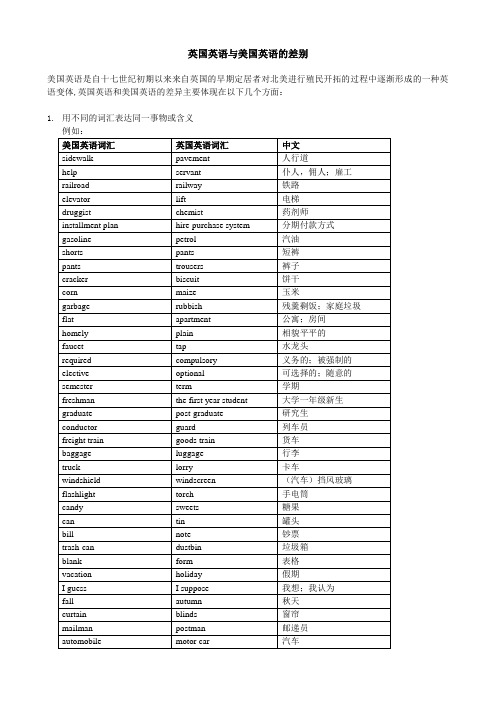
Please write to me soon
on the street
in the street
5.日期表达的差异
美国英语日期表达
英国英语日期表达
July 4
4thJuly
6.英国英语中的某些不规则动词在美国英语中常用作规则动词
例如:
动词
美国英语变体
英国英语变体
postman
邮递员
automobile
motor car
汽车
2.同一词汇表达不同的意思
例如:
词汇
美国英语意思
英国英语意思
mean
生气的;脾气不好的
小气的;吝啬的
date
约会
日期
dresser
梳妆台
碗柜;食橱
billion
十亿
万亿
biscuit
软饼
苏打饼干
overall
工装裤
紧身裤
3.某些后缀的拼写差异
flashlight
torch
手电筒
candy
sweets
糖果
can
tin
罐头
bill
note
钞票
trash-can
dustbin
垃圾箱
blank
form
表格
vacation
holiday
假期
I guess
I suppose
我想;我认为
fall
autumn
秋天
curtain
blinds
窗帘
mailman
例如:
美国英语使用的后缀
英国英语使用的后缀
美国英语与英国英语的差异
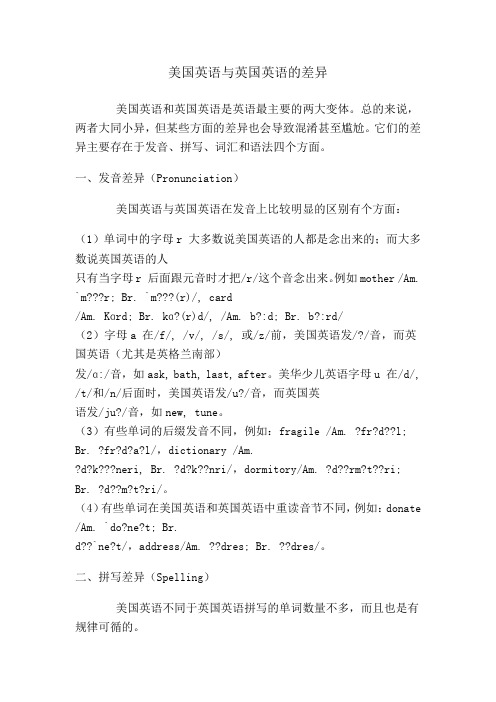
美国英语与英国英语的差异美国英语和英国英语是英语最主要的两大变体。
总的来说,两者大同小异,但某些方面的差异也会导致混淆甚至尴尬。
它们的差异主要存在于发音、拼写、词汇和语法四个方面。
一、发音差异(Pronunciation)美国英语与英国英语在发音上比较明显的区别有个方面:(1)单词中的字母r 大多数说美国英语的人都是念出来的;而大多数说英国英语的人只有当字母r 后面跟元音时才把/r/这个音念出来。
例如mother /Am. `m???r; Br. `m???(r)/, card/Am. Kɑrd; Br. kɑ?(r)d/, /Am. b?:d; Br. b?:rd/(2)字母a 在/f/, /v/, /s/, 或/z/前,美国英语发/?/音,而英国英语(尤其是英格兰南部)发/ɑ:/音,如ask, bath, last, after。
美华少儿英语字母u 在/d/, /t/和/n/后面时,美国英语发/u?/音,而英国英语发/ju?/音,如new, tune。
(3)有些单词的后缀发音不同,例如:fragile /Am. ?fr?d??l; Br. ?fr?d?a?l/,dictionary /Am.?d?k???neri, Br. ?d?k??nri/,dormitory/Am. ?d??rm?t??ri; Br. ?d??m?t?ri/。
(4)有些单词在美国英语和英国英语中重读音节不同,例如:donate /Am. `do?ne?t; Br.d??`ne?t/,address/Am. ??dres; Br. ??dres/。
二、拼写差异(Spelling)美国英语不同于英国英语拼写的单词数量不多,而且也是有规律可循的。
(1)美-ter;英-tre:center/centre; liter/litre;theater/theatre(2)美-or;英-our:color/colour; neighbor/neighbour;honor/honour(3)美-ense;英-ence:defense/defence; offense/offence(4)美-ize;英-ise/-ize:civilize/civilise (civilize); organize/organise (organize)(5)美-ll-; 英-l-:skillful/skilful; fulfill/fulfil;(6)美-l-; 英-ll-:traveling/travelling; traveled/travelled(7)某些动词的过去式和过去分词:learned/learnt;smelled/smelt; spelled/spelt; dreamed/dreamt; burned/burnt (8)其它:gray/grey; program/programme; tire/tyre。
美式英语与英式英语的区别
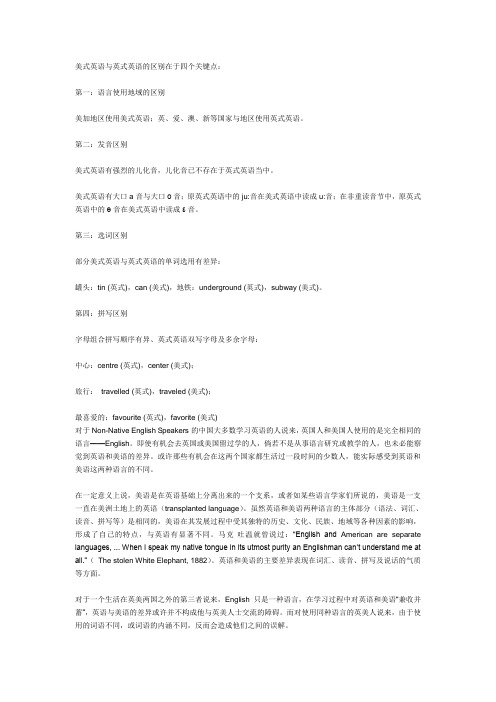
美式英语与英式英语的区别在于四个关键点:第一:语言使用地域的区别美加地区使用美式英语;英、爱、澳、新等国家与地区使用英式英语。
第二:发音区别美式英语有强烈的儿化音,儿化音已不存在于英式英语当中。
美式英语有大口a音与大口ο音;原英式英语中的ju:音在美式英语中读成u:音;在非重读音节中,原英式英语中的ə音在美式英语中读成ε音。
第三:选词区别部分美式英语与英式英语的单词选用有差异:罐头:tin (英式),can (美式),地铁:underground (英式),subway (美式)。
第四:拼写区别字母组合拼写顺序有异、英式英语双写字母及多余字母:中心:centre (英式),center (美式);旅行:travelled (英式),traveled (美式);最喜爱的:favourite (英式),favorite (美式)对于Non-Native English Speakers的中国大多数学习英语的人说来,英国人和美国人使用的是完全相同的语言——English。
即使有机会去英国或美国留过学的人,倘若不是从事语言研究或教学的人,也未必能察觉到英语和美语的差异。
或许那些有机会在这两个国家都生活过一段时间的少数人,能实际感受到英语和美语这两种语言的不同。
在一定意义上说,美语是在英语基础上分离出来的一个支系,或者如某些语言学家们所说的,美语是一支一直在美洲土地上的英语(transplanted language)。
虽然英语和美语两种语言的主体部分(语法、词汇、读音、拼写等)是相同的,美语在其发展过程中受其独特的历史、文化、民族、地域等各种因素的影响,形成了自己的特点,与英语有显著不同。
马克·吐温就曾说过:“English and American are separate languages, ... When I speak my native tongue in its utmost purity an Englishman can’t understand me at all.”(The stolen White Elephant, 1882)。
British English 和American English之间的区别

British English 和American English之间的区别我们在学习英语的过程中,往往会被英美之间的差异弄昏头脑,不仅要区别British English和American English的词汇上的区别,最好还要学会区别英音和美音,因此,我们要把British English和American English 做一个比较详细的比较,将他们区分开来,这样才有利于我们对于英语的学习。
在这里,我们主要从词汇上来区分,然后再对语法和发音这两方面进行对比,从总体上对British English和American English进行比较和区别。
1,词汇:A,British English和American English在词汇上有很大的区别,在单词的拼写上更是如此,其例子也是数不胜数,我们在学习英语的过程中会发现很多在拼写上的差异,甚至会发现一些规律,比如:-re和-er:British English部分以re结尾的词在American English中以er结尾,如: metre/meter,centimetre/centimeter, theatre/theater, centre/center 等等。
-our和-or:British English部分our在American English中的拼写为or,如:colour/color, favourite/favorite等等。
-ise和ize:British English中的-ise动词在American English中拼写为-ize,如:organise/organize, actualise/actualize, realise/realize因此而产生的衍生词也会有着相应的差别。
British English的许多词都是从法语演变过来的,有不少拼写都遵循着法语的拼写规则,而在美国经过了若干年的原因而产生了变化,但在英国依然基本上保持了这样的拼写规则。
词汇学英国英语与美国英语的区别

英
美
/ɑ:/
/æ/
/ɔ/
/ɑ/
美国英语中出现带字母r的词需要卷舌,而英国英语不卷舌
整理课件
示例 fast path hot water
5
三、用词
整理课件
1. 同一个词在英国英语、美国英语中表示不同的概念 2. 同一个概念在英国英语和美国英语中用不同词表达
英
美
英
美
First floor
二楼
一楼
地铁 行李
Underground, tube
Luggage
Subway Baggage
Corn
motor)car automobile
Term
Semester
电梯
Lift
Elevator
6
四、语法
整理课件
1. 标准英语中,一般将来时第一人称用shall;美国英语第一人
称
用will
I shall go to visit them tomorrow.(英)
18
整理课件
2. 为什么会有一词多义现象?
一句话总结就是:
单词太多了,老外也记不住
以汉语为母语的我们很容易忽视一个问题——中文和英文在 给新兴事物命名时,方法大相径庭。英语碰到新东西就习 惯弄出个新单词,而汉语往往是拼凑出一个新的词语。 举个简单的例子:
19
整理课件
Hairtail,Herring,Salmo,Bass,Corvina, Mullet,Cod,Tuna.......都是鱼。 Cod(鳕鱼)
8
整理课件
中国英语与中式英语
9
定义
整理课件
中国英语:中国英语是中国人使用的,以规范英语为核心,可 以用来表达中国社会文化各个方面的特有事物,不受母语的干 扰和影响,通过音译、译借及语义再生等多种手段进行英语交 际,具有中国特点的词汇、句式和篇章。
外语学习记忆英国英语与美国英语

外语学习记忆英国英语与美国英语外语学习一直是很多人的追求和挑战。
而在学习英语时,我们经常会听到两个国家的英语,即英国英语和美国英语。
虽然它们有很多相似之处,但也有一些细微差别。
本文将探讨英国英语和美国英语的差异以及在学习外语时应该如何处理这些差异。
一、发音差异首先,无论是英国英语还是美国英语,发音都是最重要的方面之一。
英国英语通常以标准英语(Received Pronunciation,RP)或“皇家音标”作为基准发音。
它更加正式,强调清晰的发音和元音的准确性。
然而,美国英语则较为开放,音调更加自然,常常使用美式发音和口音,如美国南部的“r”发音方式。
因此,对于学习者来说,无论选择学习英国英语还是美国英语,熟悉当地的发音差异十分重要。
二、词汇差异除了发音上的差异外,英国英语和美国英语在词汇上也存在一些差别。
由于历史和文化的原因,一些日常用词在两种英语中的称呼不同。
例如,英国英语中使用“lorry”,而美国英语更常使用“truck”来指代卡车。
同时,一些口语表达也有所不同,例如,英国英语中使用“queue”表示排队,而美国英语使用“line”。
因此,在学习和使用英语时,我们需要对这些差异进行注意和了解。
三、拼写和语法差异拼写和语法也是英国英语和美国英语的一个区别。
英国英语通常使用较多的“ou”形式,如“colour”(颜色)、“favour”(喜爱)等,而美国英语则更倾向于用“o”形式,如“color”、“favor”。
此外,在动词和名词的单复数形式、动词时态等方面也存在着一些不同。
例如,英国英语中动词“实践”(practice)的名词形式为“practise”,而美国英语中则都为“practice”。
在写作和交流中,我们应该根据所学的英语种类来遵循相应的拼写和语法规则。
四、习语和表达差异英国英语和美国英语之间的习语和表达差异也是学习者需要注意的地方。
习语是每种语言的独特表达方式,它们往往具有一定的文化背景。
美国英语和英国英语的差异
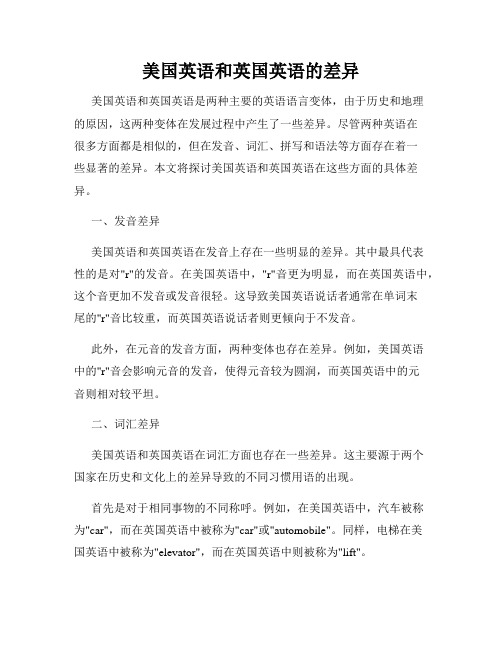
美国英语和英国英语的差异美国英语和英国英语是两种主要的英语语言变体,由于历史和地理的原因,这两种变体在发展过程中产生了一些差异。
尽管两种英语在很多方面都是相似的,但在发音、词汇、拼写和语法等方面存在着一些显著的差异。
本文将探讨美国英语和英国英语在这些方面的具体差异。
一、发音差异美国英语和英国英语在发音上存在一些明显的差异。
其中最具代表性的是对"r"的发音。
在美国英语中,"r"音更为明显,而在英国英语中,这个音更加不发音或发音很轻。
这导致美国英语说话者通常在单词末尾的"r"音比较重,而英国英语说话者则更倾向于不发音。
此外,在元音的发音方面,两种变体也存在差异。
例如,美国英语中的"r"音会影响元音的发音,使得元音较为圆润,而英国英语中的元音则相对较平坦。
二、词汇差异美国英语和英国英语在词汇方面也存在一些差异。
这主要源于两个国家在历史和文化上的差异导致的不同习惯用语的出现。
首先是对于相同事物的不同称呼。
例如,在美国英语中,汽车被称为"car",而在英国英语中被称为"car"或"automobile"。
同样,电梯在美国英语中被称为"elevator",而在英国英语中则被称为"lift"。
其次是一些不同的习惯用语。
例如,在美国英语中,人们通常使用"vacation"表示度假,而在英国英语中则更常用"holiday"来表示。
同样,晚饭在美国英语中被称为"dinner",而在英国英语中则被称为"supper"或"tea"。
三、拼写差异美国英语和英国英语在拼写上也有一些差异。
这主要源于两个国家在历史上的不同拼写传统。
其中一个明显的差异是对于某些词汇中字母的拼写。
英式英语和美式英语区别词语、发音&拼写
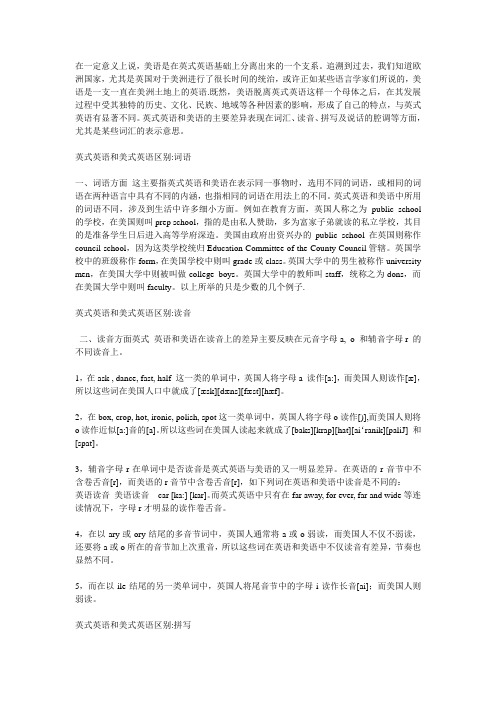
在一定意义上说,美语是在英式英语基础上分离出来的一个支系。
追溯到过去,我们知道欧洲国家,尤其是英国对于美洲进行了很长时间的统治,或许正如某些语言学家们所说的,美语是一支一直在美洲土地上的英语.既然,美语脱离英式英语这样一个母体之后,在其发展过程中受其独特的历史、文化、民族、地域等各种因素的影响,形成了自己的特点,与英式英语有显著不同。
英式英语和美语的主要差异表现在词汇、读音、拼写及说话的腔调等方面,尤其是某些词汇的表示意思。
英式英语和美式英语区别:词语一、词语方面这主要指英式英语和美语在表示同一事物时,选用不同的词语,或相同的词语在两种语言中具有不同的内涵,也指相同的词语在用法上的不同。
英式英语和美语中所用的词语不同,涉及到生活中许多细小方面。
例如在教育方面,英国人称之为public school 的学校,在美国则叫prep school,指的是由私人赞助,多为富家子弟就读的私立学校,其目的是准备学生日后进入高等学府深造。
美国由政府出资兴办的public school在英国则称作council school,因为这类学校统归Education Committee of the County Council管辖。
英国学校中的班级称作form,在美国学校中则叫grade或class。
英国大学中的男生被称作university men,在美国大学中则被叫做college boys。
英国大学中的教师叫staff,统称之为dons,而在美国大学中则叫faculty。
以上所举的只是少数的几个例子.英式英语和美式英语区别:读音二、读音方面英式英语和美语在读音上的差异主要反映在元音字母a, o 和辅音字母r 的不同读音上。
1,在ask , dance, fast, half 这一类的单词中,英国人将字母a 读作[a:],而美国人则读作[æ],所以这些词在美国人口中就成了[æsk][dæns][fæst][hæf]。
英国英语和美国英语
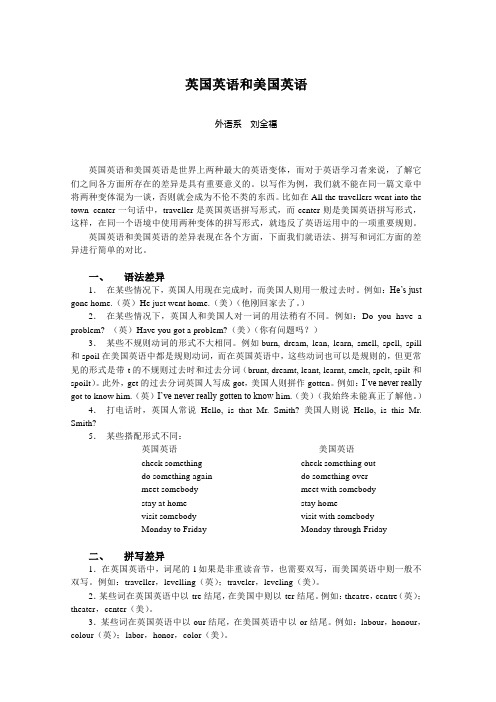
英国英语和美国英语外语系刘全福英国英语和美国英语是世界上两种最大的英语变体,而对于英语学习者来说,了解它们之间各方面所存在的差异是具有重要意义的。
以写作为例,我们就不能在同一篇文章中将两种变体混为一谈,否则就会成为不伦不类的东西。
比如在All the travellers went into the town center一句话中,traveller是英国英语拼写形式,而center则是美国英语拼写形式,这样,在同一个语境中使用两种变体的拼写形式,就违反了英语运用中的一项重要规则。
英国英语和美国英语的差异表现在各个方面,下面我们就语法、拼写和词汇方面的差异进行简单的对比。
一、语法差异1.在某些情况下,英国人用现在完成时,而美国人则用一般过去时。
例如:He’s just gone home.(英)He just went home.(美)(他刚回家去了。
)2.在某些情况下,英国人和美国人对一词的用法稍有不同。
例如:Do you have a problem? (英)Have you got a problem?(美)(你有问题吗?)3.某些不规则动词的形式不大相同。
例如burn, dream, lean, learn, smell, spell, spill 和spoil在美国英语中都是规则动词,而在英国英语中,这些动词也可以是规则的,但更常见的形式是带-t的不规则过去时和过去分词(brunt, dreamt, leant, learnt, smelt, spelt, spilt和spoilt)。
此外,get的过去分词英国人写成got,美国人则拼作gotten。
例如:I’ve never really got to know him.(英)I’ve never really gotten to know h im.(美)(我始终未能真正了解他。
)4.打电话时,英国人常说Hello, is that Mr. Smith? 美国人则说Hello, is this Mr. Smith?5.某些搭配形式不同:英国英语美国英语check something check something outdo something again do something overmeet somebody meet with somebodystay at home stay homevisit somebody visit with somebodyMonday to Friday Monday through Friday二、拼写差异1.在英国英语中,词尾的-l如果是非重读音节,也需要双写,而美国英语中则一般不双写。
英国英语和美国英语的差异

2462019年19期总第459期ENGLISH ON CAMPUS英国英语和美国英语的差异文/徐婷婷由于历史传统、民族习性以及社会发展状况各个方面的不同,美国英语(American English)与英国英语(British English)之间存在着诸多的差别。
一般的中国人对美国英语和英国英语的差别是什么没有概念,反正只要是大鼻子外国人嘴里讲出来的英语,就都是咱们要学习的英语,管他是哪国英语呢。
但近些年来随着雅思、托福等国际著名英语考试在中国的普及,中国同学开始知道美国英语与英国英语有差别,比如雅思就是英国英语的考试,托福就是美国英语的考试。
下面将就美国英语和英国英语几方面的差异进行说明比较。
一、单词拼写上的差异一般来说,美国英语的单词比英国英语单词要简单。
近年来,美国英语越来越趋向简化,充分体现了美国人生活和工作高效快捷的现代化特性,美式英语单词的拼写从一定程度上反映了美国人的性格特征。
这些较为简化的词大都源于英国英语,大量词汇在英国英语里仍然保持原貌,而进入美国英语后,这些单词就逐渐变得简单起来,从而使用起来较为方便。
如常见的单词colour(颜色),在美国英语里就拼写成color,少了一个“u”字母。
类似的还有像honour,favour等词汇的拼写。
美国英语单词拼写上的简化现象是美国英语与英国英语在单词拼法上的差异的主要表现。
一些在英式英语中以re结尾的单词在美式英语里以er结尾,如centre/center。
英式英语中有一些单词名词形式中的c在动词形式中要变成s,但是美式英语中不存在这样的情况,全部都用c,如practice/ practise在英式英语中前者为名词,后者为动词,而美式英语中不论动词名词都是practice。
再比如英式英语中的license和license,在美式英语中都为license。
二、发音和语调方面即使一个国家内部地域间的口音仍有巨大差别,如美国南北部居民之间口音差别。
英式英语和美式英语的区别
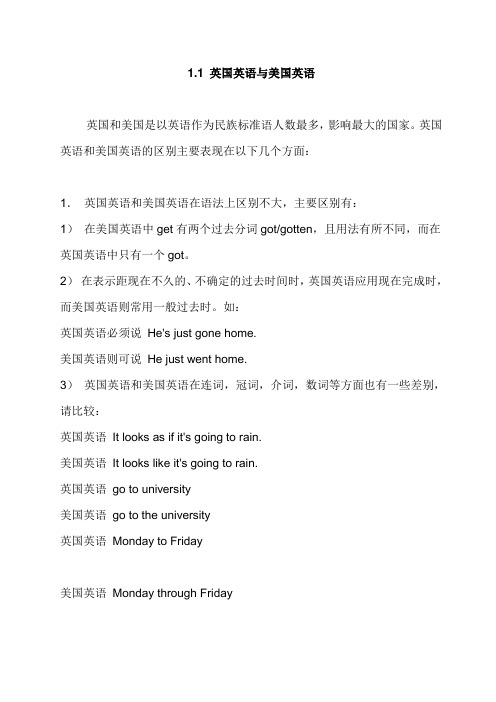
1.1 英国英语与美国英语英国和美国是以英语作为民族标准语人数最多,影响最大的国家。
英国英语和美国英语的区别主要表现在以下几个方面:1.英国英语和美国英语在语法上区别不大,主要区别有:1)在美国英语中get有两个过去分词got/gotten,且用法有所不同,而在英国英语中只有一个got。
2)在表示距现在不久的、不确定的过去时间时,英国英语应用现在完成时,而美国英语则常用一般过去时。
如:英国英语必须说He's just gone home.美国英语则可说He just went home.3)英国英语和美国英语在连词,冠词,介词,数词等方面也有一些差别,请比较:英国英语It looks as if it's going to rain.美国英语It looks like it's going to rain.英国英语go to university美国英语go to the university英国英语Monday to Friday美国英语Monday through Friday4)在demand, insist, require, suggest等的宾语从句中,英国英语通常要求用should+原形动词,而美国英语则要求用原形动词。
如:英国英语I suggested that Jack should take over the job.美国英语I suggested that Jack take over the job.5)need, dare, used to等动词在英国英语中通常用作情态动词,而在美国英语中则用作实义动词。
如:英国英语I daren't do it.美国英语I don't dare to do it.2.在词汇上,英国英语和美国英语的差别较多。
如:拼写差别:美国英语英国英语program programmetraveling travellingcolor colourneighbor neighbourcheck chequecenter centre异词同义:美国英语英国英语意义fall autumn 秋天elevator lift 电梯gas petrol 汽油mail post 邮寄cab taxi 出租车candy sweets 糖果同词异义: 词汇美国英语英国英语billion 十亿万亿corn 玉米谷物pants 长裤短裤public school 公立学校私立学校second floor 二楼三楼3.在语音上,英国英语和美国英语的差别也较大。
美国英语与英国英语的差异
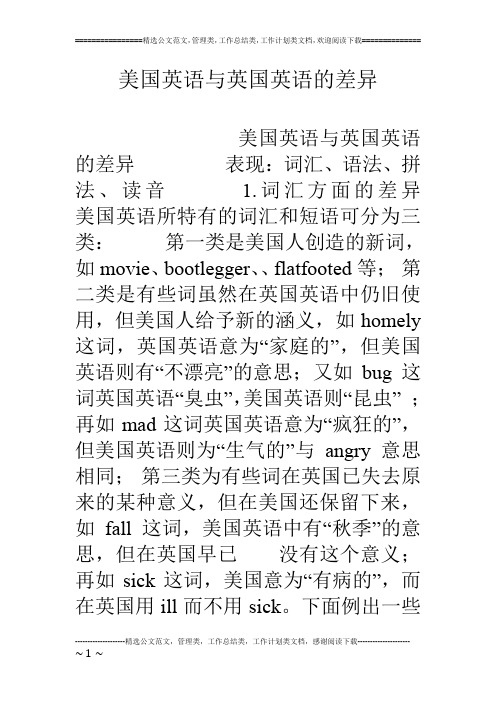
美国英语与英国英语的差异美国英语与英国英语的差异表现:词汇、语法、拼法、读音 1.词汇方面的差异美国英语所特有的词汇和短语可分为三类:第一类是美国人创造的新词,如movie、bootlegger、、flatfooted等;第二类是有些词虽然在英国英语中仍旧使用,但美国人给予新的涵义,如homely 这词,英国英语意为“家庭的”,但美国英语则有“不漂亮”的意思;又如bug这词英国英语“臭虫”,美国英语则“昆虫” ;再如mad这词英国英语意为“疯狂的”,但美国英语则为“生气的”与angry意思相同;第三类为有些词在英国已失去原来的某种意义,但在美国还保留下来,如fall这词,美国英语中有“秋季”的意思,但在英国早已没有这个意义;再如sick这词,美国意为“有病的”,而在英国用ill而不用sick。
下面例出一些单词供参考。
美国英语英国英语标heading caption 题礼assembly hall auditorium 堂bulletin board 布notice board 告板点roll book class book 名簿大first-year freshman 学class class 一年级小standard grade graduate student instructor junior junior class math memorize 学年级研究生讲师大学三年级生大学三年级数学熟postgraduate lecturer third-year student third-year class maths learn by heart 记铅pencil-box 笔盒中principal 小学校长private school 私立学校public school 公立学校必required 修subject 科学semester 期pencil-case head master non-provided school council school compulsory subject term 假期酒bar 吧间理发师beauty parlor 美容室糖candy store 果店连chain store 锁商店vacation holidays public h ouse men’s hairdresser ladies’ hairdresser sweet shop multiple shop。
- 1、下载文档前请自行甄别文档内容的完整性,平台不提供额外的编辑、内容补充、找答案等附加服务。
- 2、"仅部分预览"的文档,不可在线预览部分如存在完整性等问题,可反馈申请退款(可完整预览的文档不适用该条件!)。
- 3、如文档侵犯您的权益,请联系客服反馈,我们会尽快为您处理(人工客服工作时间:9:00-18:30)。
关于英国英语和美国英语的区别多有讨论,今天我给大家来个简单的总结吧。
在总结前有三句话说在前头:1. 倒退三四百年世界上没有所谓的标准英语,标准的英音和美音是上流社会经济和文化的产物。
2. 英式英语和美式英语沟通不存在问题,所以学那种都可以。
3. 英音和美音各有自己的特点,所以学那种都可以,不存在说美音的人听不懂英音的情况。
今天就给大家看几篇西方人对英美英语的区别的总结。
第一篇是位教书有10年的英国教师的总结There are many well-known differences between British and American English, but these differences won't cause you any serious problems if you come and work in Britain.First, there are a few noticeable GRAMMAR differences between British and American English: I'll talk about the two most important ones.First of all, when Americans make sentences using 'just', 'already' or 'yet', they normally use the past simple tense, while in Britain, we use the present perfect.So an American, for example, might say:"I already had lunch.""She didn't arrive yet."And a British person would say:"I've already had lunch." - That's "I have already had lunch."Or... "She hasn't arrived yet."Also, in Britain we often use 'have got' or 'has got' when we talk about possession, while Americans generally just use 'have' or 'has'.So, for example, in American English we might say:"I have a new car."In British English it's more normal to say:"I've got a new car."The meaning's the same, there's just a small grammatical difference that you might notice.There are these and a few other very small differences, but to be honest, these differences almost never make it difficult for us to understand each other.On the other hand, the differences in VOCABULARY between American English and British English are stronger than the grammatical differences, but again, these very rarely cause serious problems.A lot of the words which are different are informal or slang words...For example, I think many Americans would be unfamiliar with the British slang word 'naff', which means 'un-cool' or 'poor-quality'.On the other hand, a Brit (a British person) might be very confused by a sentence like:"The café is kitty-corner to the pharmacy."This means that the café is diagonally opposite to the pharmacy, but we don't have the word'kitty-corner' in British English.Another example would be telling the time...If we want to describe 2:45 in Britain, we might say:"Quarter to three", or 3:15 would be "Quarter past three".On the other hand, in America, these might be:"Quarter of three" for 2:45, or "Quarter after three" for 3:15.It's another small difference, but it's one that's not going to cause serious problems - it's quite easy to get used to.There are also some differences in SPELLING which I should mention.One example of this is the verb 'to practise':In British English, this is spelt with an 'S', so that'sP-R-A-C-T-I-S-E.In American English, it's spelt with two 'C's, so in American English it'sP-R-A-C-T-I-C-E.And there are lots of other examples of slight difference of spelling, but about 99% of the time, British and American people can understand each other without any trouble at all. In Britain we watch lots of American films and TV programs, and we listen to lots of American music, so American English is generally very familiar to us.This is probably not quite so true for an American coming to Britain. Americans, I think, don't watch quite so much British TV or British movies.I should also point out that regional English can be an important thing to think about. Not everyone in Britain talks like James Bond. There are some regional accents in Britain which you don't hear so often in the movies, and these might be a bit more difficult to get used to.However, I'd like to finish by saying that many, many Americans live and work in Britain, and they don't have any serious language problems at all. So, Brittney, my advice to you is: don't worry about the language, you'll be fine!第二篇关于两种拼写牛津在线词典给了详细的说明British and American spellingThere are several areas in which British and American spelling are different. These are the main ones to be aware of.Words ending in –reBritish English words that end in -re often end in -er in American English:Words ending in -ourBritish English words ending in -our usually end in -or in American English:Words ending in -ize or -iseVerbs in British English that can be spelled with either -ize or -ise at the end are always spelled with -ize at the end in American English:Words ending in -yseVerbs in British English that end in -yse are always spelled -yze in American English:Words ending in a vowel plus lIn British spelling, verbs ending in a vowel plus l double the l when adding endings that begin with a vowel. In American English, the l is not doubled:Words spelled with double vowelsBritish English words that are spelled with the double vowels ae or oe are just spelled with an e in American English:Note that in American English, certain terms, such as archaeology, keep the ae spelling as standard, although the spelling with just the e (i.e. archeology) is usually acceptable as well.Nouns ending with –enceSome nouns that end with -ence in British English are spelled -ense in American English:Nouns ending with –ogueSome nouns that end with -ogue in British English end with either -og or -ogue in American English:The distinctions here are not hard and fast. The spelling analogue is acceptable but not very common in American English; catalog has become the US norm, but catalogue is not uncommon; dialogue is still preferred over dialog.Aside from spelling differences, many items and practices have different names in British and American English. To explore further, see British and American terms.第三篇这位老师给了更详细的一个说明IntroductionSpeakers of American English generally use the present perfect tense (have/has + past participle) far less than speakers of British English. In spoken American English it is very common to use the simple past tense as an alternative in situations where the present perfect would usually have been used in British English. The two situations where this is especially likely are:(i) In sentences which talk about an action in the past that has an effect in the present: American English / British English•Jenny feels ill. She ate too much.•Jenny feels ill. She's eaten too much.•I can't find my keys. Did you see them anywhere?•I can't find my keys. Have you seen them anywhere?(ii) In sentences which contain the words already, just or yet:American English / British English•A: Are they going to the show tonight?•B: No. They already saw it.•A: Are they going to the show tonight?•B: No. They've already seen it.•A: Is Samantha here?•B: No, she just left.•A: Is Samantha here?•B: No, she's just left.•A: Can I borrow your book?•B: No, I didn't read it yet.•A: Can I borrow your book?•B: No, I haven't read it yet.1. Verb agreement with collective nounsIn British English collective nouns, (i.e. nouns referring to particular groups of people or things), (e.g. staff , government, class, team) can be followed by a singular or plural verb depending on whether the group is thought of as one idea, or as many individuals, e.g.:My team is winning.The other team are all sitting down.In American English collective nouns are always followed by a singular verb, so an American would usually say:Which team is losing?whereas in British English both plural and singular forms of the verb are possible, as in:Which team is/are losing?2. Use of delexical verbs have and takeIn British English, the verb have frequently functions as what is technically referred to as a delexical verb, i.e. it is used in contexts where it has very little meaning in itself but occurs with an object noun which describes an action, e.g.:I'd like to have a bath.Have is frequently used in this way with nouns referring to common activities such as washing or resting, e.g.:She's having a little nap.I'll just have a quick shower before we go out.In American English, the verb take, rather than have, is used in these contexts, e.g.:Joe's taking a shower.I'd like to take a bath.Let's take a short vacation.Why don't you take a rest now?3. Use of auxiliaries and modalsIn British English, the auxiliary do is often used as a substitute for a verb when replying to a question, e.g.:•A: Are you coming with us?•B: I might do.In American English, do is not used in this way, e.g.:•A: Are you coming with us?•B: I might.In British English needn't is often used instead of don't need to, e.g.:They needn't come to school today.They don't need to come to school today.In American English needn't is very unusual and the usual form is don't need to, i.e.:They don't need to come to school today.In British English, shall is sometimes used as an alternative to will to talk about the future, e.g.:I shall/will be there later.In American English, shall is unusual and will is normally used.In British English shall I / we is often used to ask for advice or an opinion, e.g.:Shall we ask him to come with us?In American English should is often used instead of shall, i.e.:Should we ask him to come with us?4. Use of prepositionsIn British English, at is used with many time expressions, e.g.:at Christmas/five 'o' clockat the weekendIn American English, on is always used when talking about the weekend, not at, e.g.:Will they still be there on the weekend?She'll be coming home on weekends.In British English, at is often used when talking about universities or other institutions, e.g.: She studied chemistry at university.In American English, in is often used, e.g.:She studied French in high school.In British English, to and from are used with the adjective different, e.g.:This place is different from/to anything I've seen before.In American English from and than are used with different, e.g.:This place is different from/than anything I've seen before.In British English to is always used after the verb write, e.g.:I promised to write to her every day.In American English, to can be omitted after write, i.e.:I promised to write her every day.5. Past tense formsBelow is a table showing verbs which have different simple past and past participle forms in American and British English. Note that the irregular past forms burnt, dreamt and spoilt are possible in American English, but less common than the forms ending in -ed.Infinitive Simple past(Br) Simple past(Am)Past participle(Br)Past participle(Am)burn burned/ burned/ burned/ burned/(Br) (Am) (Br) (Am)burnt burnt burnt burnt bust bust busted bust busteddive dived dove/diveddived diveddream dreamed/dreamt dreamed/dreamtdreamed/dreamtdreamed/dreamtget got got got gottenlean leaned/leant leaned leaned/leantleanedlearn learned/learnt learned learned/learntlearnedplead pleaded pleaded/pled pleaded pleaded/pledprove proved proved proved proved/provensaw sawed sawed sawn sawn/sawedsmell smelled/smelt smelled smelled/smeltsmelledspill spilled/spilt spilled spilled/spiltspilled(Br) (Am) (Br) (Am)spoil spoiled/spoilt spoiled/spoiltspoiled/spoiltspoiled/spoiltstink stank stank/stunkstunk stunkwake woke woke/wakedwoken wokenNote that have got is possible in American English, but is used with themeaning 'have', gotten is the usual past participle of get, e.g.American English British EnglishYou've got two brothers(= you have two brothers)You've got two brothersYou've gotten taller this year You've got taller this year6. Implications for teachingThe two major varieties of EnglishThe two varieties of English most widely found in print and taught around the world are British and American - it is therefore important for teachers to be aware of the major differences between the two. And while lexical differences are the easiest ones to notice, a knowledge of grammatical and phonological differences can be useful not only for teachers to be aware of, but also to be able to deal with should they come up in class.Which is better?An important point to make is that different doesn’t mean wrong. Comments such as “American English is inferior to British English”, or “American English is better than British English” have no solid basis other than the speaker’s opinion. The truth is that no language or regional variety of language is inherently better or worse than another. They are just different. Students will often have very firm beliefs on which English they think isbetter/easier to understand/clearer etc. While it may be true for that particular individual,there is no evidence to suggest that one variety is easier to learn or understand than the other.Materials and varietiesIf you are an American English speaker teaching with a British coursebook or vice versa, what do you say when the book is different from your English? The answer here is to point out the difference. The differences are not so numerous as to overload the students and often can be easily dealt with. For example, if you are an American English speaker using a lesson that has just incl uded “at the weekend” it takes very little time to point out that in American English people say “on the weekend”. Accept either from your students then. If you decide to go along with the book and say “at the weekend” yourself, you’ll probably sound unnat ural, and “on the weekend” might slip out anyway!Exams and essay writingIn most international exams, both varieties of English are accepted. However, while writing for an international exam (or writing in English generally) students should try to remain consistent. That means if they favour (or favor) American spelling and grammar, they should stick to that convention for the whole piece of writing.What role do other varieties of English have in the classroom?Although British and American varieties are the most documented, there are of course many other varieties of English. Scotland, Ireland, South Asia, Canada, Australia, New Zealand, West Africa, the Caribbean, South Africa all have their own regional variations of English. The decision whether or not to highlight aspects of these Englishes would depend on two factors:if the students are going to live, or are already living, in one of these places - in which case the need to understand specific aspects of that English is clear; orif the teacher is from one of those places and therefore speaks a regional variation of English. In this case it could be useful to occasionally point out differences between your English and that of your Anchor Point:bottomcoursebook (see point 3 above about using your own variety).。
